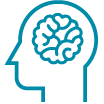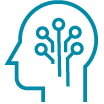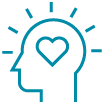Acute Brain Injury Program
Our multidisciplinary team treats traumatic and non-traumatic brain injuries, including aneurysm, anoxia and tumors, at each stage of recovery. Brain injuries affect not only psychological skills, but also physical, emotional and intellectual skills. It is important to us that we understand who you are in the world so we can help you get back to what you love. We work as a team to treat all aspects of you and your injury so that you can return to the community at the highest level of function possible.
How We Treat
We understand with a brain injury, you have your own unique physical, cognitive, educational and behavioral needs. Following an evaluation our multidisciplinary team works to increase you independence, vocational, leisure, communication and coping skills in an effort to get you integrated back into society. Through rehabilitative therapies, psychology, education and other treatments, we work towards individual goals created to meet your specific needs. We want to get you back into the community and help you maintain what you’ve learned.

Using principles of Cognitive Behavioral Therapy we help change your patterns of thinking or behavior that may be causing challenges or difficulties in order change the way you feel.

Speech/Language, physical and occupational therapists work with you to improve speech, swallowing/feeding issues and completing daily activities.

We teach you how to maintain skills learned. Family plays an important role in the rehabilitation, and will be educated in helping you maintain those skills.
Program Highlights
- Chemical and substance abuse relapse prevention
- Spiritual Care to aid in working with cultural and spiritual beliefs
- Support Groups
Admission
We treat medically stable individuals with traumatic or non-traumatic brain injury over the age of 15. An individual must be within 6 months of onset for a traumatic brain injury or within three months of onset for a non-traumatic brain injury.
Discharge
Discharge plan is created upon admission. We will assist in coordinating community resources, mental health support, chemical-dependency counseling and family support.